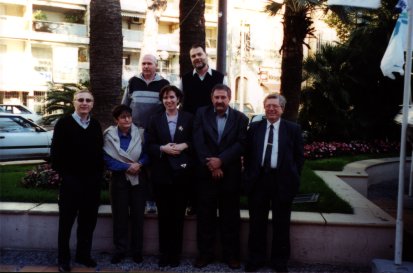<< Back to the contents of "About NHH"
IST Conference in NiceThe venue of the IST Conference was quite uncommon in 2000. The technological trends of a user-friendly information society were discussed at the same place where the prime ministers subsequently discussed and decided on the future of the enlargement of the European Union. The plenary sessions and sections of the IST Conference were held at 8 locations of the Congress Palace of Nice for three days in early November from morning to night. The participants could foretaste in a huge exhibition area the infocommunications products and services of the different countries including Hungary, the innovative solutions of various institutions and the novelties mentioned during the lectures. The dynamic programs and multiple locations required the collectors of intellectual wealth to develop their strategies very carefully. Practical people discussed with their colleagues, compatriots and foreign friends who of them would visit the various exhibitions or lectures, then they shared their experience and eventually returned with much more useful information. The National Host of Hungary was represented by five experts in Helsinki in 1999. They reported on their experience to the representatives of other member organisations many of whom found it important to visit the following conference. Of course, it was necessary that the travel expenses be covered from the accumulated membership fees. Finally, eight active members of the Society could attend the conference in Nice to collect as much information as possible from multiple locations. What did they find the most unforgettable? It is interesting to browse through the verbal and written reports. Both Dr. Zsolt Balassy and Dr. Géza Gordos pointed out the message and tone of the opening lecture. Erkki Liikanen, the EU officer in charge of the IST, stressed the necessity of user-friendly market means for the creation of the information society. Regulators should promote the creation and smooth operation of these means. And the authorities should provide for consumer protection if there is scarce supply of products and services. He regarded the widening practice of frequency auctions as a phenomenon impeding and adversely affecting development. The subsequent sections addressed social life, business and technological solutions. The various aspects of electronic commerce, law, human relationships, electronic health care, electronic government relations, the social impacts of increasing bandwidths, the changes in the role of entertainment and the media industry, the prospects of education and the developing countries, the use and abuse of copyright and the increasing costs of software were addressed, among other things. Technical topics included nanotechnology, the problems and possibilities of circuit production, embedded processing, networking, application and service platforms, IP as a convergence layer of voice, image and data communication, the possible achievement of a bit rate of 20 Tbit/s, easily tunable optical filters, optical amplification, three dimensional optical storage and the close reality of photonic crystals as a means of further miniaturisation. Chairman Balázs Martos noticed a number of research, development and demonstration topics to be well made use of by the Host's advanced telecommunications, IT and studio equipment. For example, quality of service (QoS) is gaining increasing importance in connecting different Internet networks. The joint work of manufacturers and service providers during their co-operation should be subjected to frequent tests. The Host can be an ideal forum for qualitative "extranet" experiments linked to one or more service providers. The Society's infrastructure can also be used to develop new solutions for interactive information and entertainment or to increase the efficiency and quality of content services. The advanced telecommunications infrastructure and studio equipment create excellent opportunities for high-quality educational or health consultations and demonstrations. Executive Officer Dr. Zsolt Balassy stressed: 2000 was a year of development. The infrastructure developed so far offers excellent opportunities for the society and the Host. To make the best use of it, we need to know the most recent result of the researchers and developers of the European Union and the trends of the forthcoming years. The members of the delegation unanimously believe that it is well supported by the information, experience, professional and human relationships acquired at the IST Conference. The rate of revenues generated by the utilisation of new information to the expenses of participation will certainly be positive. But the Host can benefit from its participation in the annual IST Conferences not only in financial and professional but in human respects as well. Our co-operation abilities will improve both inside and outside the country because we get to know each other and our foreign colleagues at these high-level events.
Copyright © MNH 1999 |
